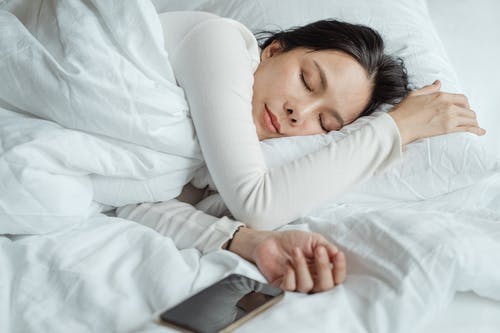When we think of health and wellbeing our minds often turn to our diet and exercise habits but very rarely do we consider sleep and rest in as much detail. In a society where doing plenty of exercise and eating healthy foods is admired, it sometimes feels like running on little sleep makes someone revered as almost superhuman. Phrases such as ‘burning the candle at both ends’, ‘no rest for the wicked’ and generally discussing how busy we are are such common parts of our vocabulary we rarely give them a second thought. If you’re keen on making changes to your health and fitness, especially if you’ve tried and failed in the past – this blog aims to discuss why such changes may even start with your sleep habits. Sleep has very many health benefits, both physical and psychological and it’s about time we prioritised it as a basic health habit and not a luxury or afterthought.
Why do we need sleep?
Energy – I’m sure this seems pretty obvious as if I was to ask you what happens when you don’t get enough sleep most people would say they feel tired! However, so many of us overlook getting more sleep when we’re finding ways to boost our energy. From vitamin pills to energising shower gels to blood tests, we live in a fast-paced world where energy is a prized resource and we’ll try anything to have a constant stream of it. We’ll happily spend money to get more, joke about needing coffee to function and moan to friends about our lack of it but are we willing to prioritise sleep and see if that helps?! It really is one of the easiest and cheapest ways to boost both physical and mental energy levels which can have knock on effects in many areas of life.
Brain health – Sleep allows our brain to rest and recover. Without it we will likely lack concentration and productivity. Our memory and reaction times can be affected, as can our mood. Sleep allows us to tackle the stresses and challenges of everyday life with a more positive attitude whereas if we are lacking sleep we may feel more helpess and lethargic. Sleep gives us an opportunity to switch off from the constant input from our senses whilst we’re awake so the brain can process and repair. If you feel that your brain is always running in second (or third or fourth gear depending on the day of the week!), consistent and plentiful rest could be just what you need!
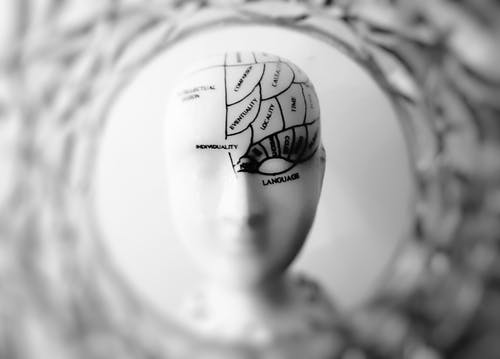
Body health – Lack of sleep has been linked to a higher risk of medical diseases including obesity, type 2 diabetes, high blood pressure, stroke, heart disease, poor mental health and early death. Whilst these may sound excessive to some and are certainly not going to be a consequence of a bad night or your child going through a bad sleeping phase, it highlights the importance of sleep for our long-term health. If you’re serious about your health and considering or currently making changes to your diet and exercise habits, you should also consider how sleep can be critical to success in these areas. Adequate rest and sleep can also help the body to recover between training sessions thus allowing us to get the maximum benefits from our hard work and providing more energy for upcoming workouts too.
Supports healthy weight management – Have you ever noticed that when you’re lacking sleep or rest your appetite seems insatiable?! Of course if we’re tired we will naturally crave foods high in energy including high sugar and fatty foods to give us a boost. Such foods can contribute to weight gain in the long-term. There’s actually a chemical explanation for this effect on appetite in that lack of sleep increases levels of ghrelin (the hormone that stimulates appetite) and reduces levels of leptin (the hormone that suppresses appetite). So forget that fad diet, pills that claim to suppress appetite and those magazine articles telling you what your cravings mean – prioritise rest and monitor the effect on your appetite and cravings. Further affecting our weight, lack of sleep will likely reduce our motivation to exercise and our willpower to make healthy dietary choices thus having a double pronged negative effect.
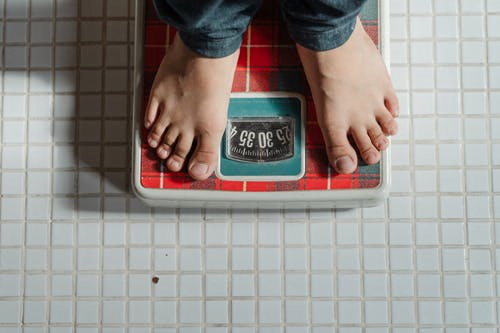
How much sleep do we need?
The average adult aged from 18-64 years needs around 7-9 hours a night. Children and teens need more (generally the younger the child the more sleep they need) and older adults slightly less at 7-8 hours. Whilst this is a generic rule and not all sleep is created equal (see below), it’s worth considering if you fall far outside of this recommended figure and working to address this if so.
Improving sleep habits – Your perfect evening routine
Whilst there are recommendations for the length of sleep needed for optimum health, things can get more technical when you start to consider stages of sleep. If you’re interested in tracking your sleep in such detail you can do this through many fitness trackers that are on the market nowadays and can also do further research online. In the interests of this blog, however, we just need to note that not just the quantity but the quality of sleep is also important. Below are 10 top tips which may help with improving both of these.
- Journal – This can be a great way of clearing any thoughts from your mind before your head hits the pillow. It can help us to work through thoughts and sometimes see a different, more helpful perspective or it can simply give us a place to leave them so we can pick them up in the morning. It may be useful to keep a notepad and pen by the bed to jot down anything that crops up as you’re trying to drift off too, again so your mind can rest easy knowing you can remember to deal with it tomorrow. A really important tip for evening journaling is to keep a positive perspective wherever possible to ensure you go to sleep in a good mindset. Journal prompts such as writing 3 things you achieved today, 3 things you’re grateful for or something that made you smile or feel proud of yourself today can be useful examples.

2. Try some light stretches – This can help to improve sleep by aiding muscular relaxation to help relax the body. Slow movements can help to slow the breathing and again promote a relaxation response. If you are doing any other form of exercise try to keep it earlier in the day as it can have an energising and awakening effect.
3. Have a warm drink – This can be a really soothing part of an evening routine as warm drinks are often associated with comfort and calm. Limit caffeine and alcohol before sleep as they have a stimulant effect. We’re all different in how much and for how long they affect us with some people limiting them after lunch time and others after evening meal but try bringing your last caffeinated drink forward a little at a time and notice any effects on sleep. Explore decaffeinated options or naturally decaff drinks such as herbal teas.
4. Self-massage – Similar to light stretching, massage helps to calm the nervous system and promote muscular relaxation. You could focus on any areas that feel particularly tense such as your legs, perhaps get somebody to help melt the tension away from your shoulders or try the hands and feet with their many pressure points for an easy place to start. There are many simple guides to self-massage available online but if you still struggle, massage guns are a popular option at the moment. For further relaxation effects, try using a cream or oil with a soothing scent such as lavender or vanilla.
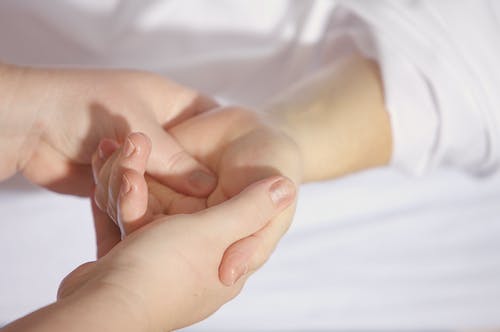
5. Limit screen time – Again, we’re all different in how long we may need to or be able to do this for but consider what’s practicable for you. Try starting with no electronic devices from half an hour before bedtime and increase to an hour. This shuts down the constant input into our senses which stimulates our brain and also reduces blue light which can have a negative effect on sleep and energy levels.
6. Read a book – Linked to limiting screen time, a book can be a good way to switch off from your thoughts without watching a screen and thus help to soothe the mind into a restful place.
7. Listen to a meditation or soothing music – If you find your thoughts rattling around in your head in the silence of night, this can be a great way to shift your focus and provide distracting yet relaxing background noise. Try YouTube or free content on apps like Calm or Headspace to get you started.
8. Dim the lights – Our circadian rhythms (the bodies natural sleep/wake cycles) are influenced heavily by light. When it’s lighter, the body produces cortisol which energises us. When it’s dark we produce melatonin which aids sleep. Try blackout curtains, blinds or an eye mask whilst sleeping and reducing light sources in an evening wherever possible.
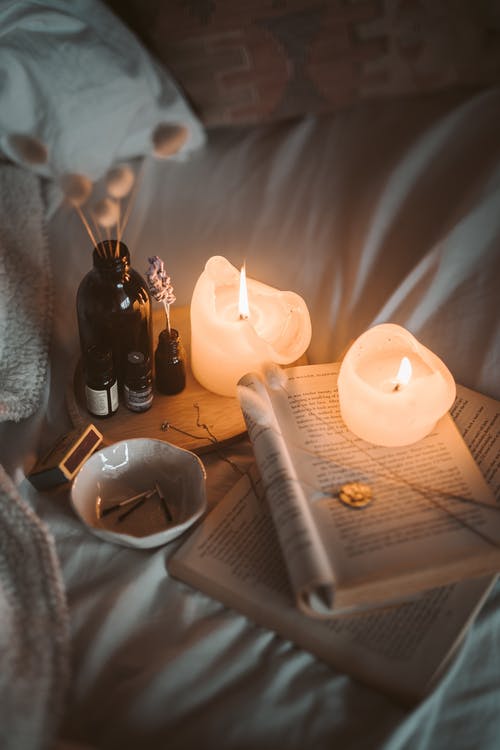
9. Have a warm bath or shower – Not only can the warmth help our body to relax and melt away any muscular tension, the temperature of the body drops once we get out which can help to induce sleep. This is again linked to circadian rhythms and our bodies natural changes that occur at different times of the day. Studies have shown the best effects on sleep quality occur if we bath or shower 1-2 hours before bedtime. Again you can include relaxing scents or products around this part of your evening routine for additional effects.
10. Explore supplements – Last but not least, if you’d like to take something that may support a good night’s sleep there are plenty of herbal remedies and supplements available in pharmacies and health food shops. It’s essential that you speak to a qualified person in this area to ensure the right supplement for you and so be sure to conduct thorough research.
As always, I hope you’ve found this blog informative. If, like me, you struggle with your sleep habits then please let it inspire you to prioritise your rest for the benefits to your mental and physical health. Try including some of the top tips above to create your own perfect evening routine and as always if you have any questions or suggestions for blog topics feel free to contact me on Instagram. Stay well 🙂
Bev Meakin – Personal Trainer/ Exercise Referral Officer and Complementary Therapist. Instagram @bevs_life

